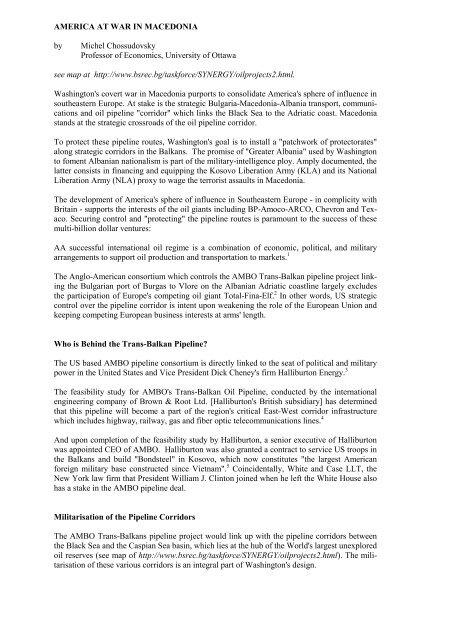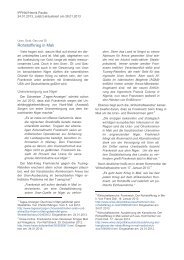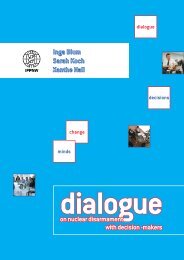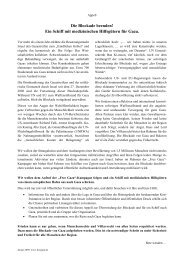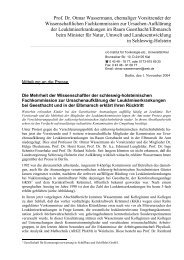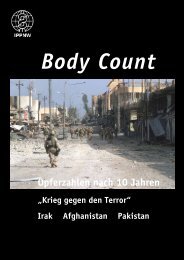AMERICA AT WAR IN MACEDONIA by Michel Chossudovsky - ippnw
AMERICA AT WAR IN MACEDONIA by Michel Chossudovsky - ippnw
AMERICA AT WAR IN MACEDONIA by Michel Chossudovsky - ippnw
Create successful ePaper yourself
Turn your PDF publications into a flip-book with our unique Google optimized e-Paper software.
<strong>AMERICA</strong> <strong>AT</strong> <strong>WAR</strong> <strong>IN</strong> <strong>MACEDONIA</strong><br />
<strong>by</strong> <strong>Michel</strong> <strong>Chossudovsky</strong><br />
Professor of Economics, University of Ottawa<br />
see map at http://www.bsrec.bg/taskforce/SYNERGY/oilprojects2.html.<br />
Washington's covert war in Macedonia purports to consolidate America's sphere of influence in<br />
southeastern Europe. At stake is the strategic Bulgaria-Macedonia-Albania transport, communications<br />
and oil pipeline "corridor" which links the Black Sea to the Adriatic coast. Macedonia<br />
stands at the strategic crossroads of the oil pipeline corridor.<br />
To protect these pipeline routes, Washington's goal is to install a "patchwork of protectorates"<br />
along strategic corridors in the Balkans. The promise of "Greater Albania" used <strong>by</strong> Washington<br />
to foment Albanian nationalism is part of the military-intelligence ploy. Amply documented, the<br />
latter consists in financing and equipping the Kosovo Liberation Army (KLA) and its National<br />
Liberation Army (NLA) proxy to wage the terrorist assaults in Macedonia.<br />
The development of America's sphere of influence in Southeastern Europe - in complicity with<br />
Britain - supports the interests of the oil giants including BP-Amoco-ARCO, Chevron and Texaco.<br />
Securing control and "protecting" the pipeline routes is paramount to the success of these<br />
multi-billion dollar ventures:<br />
AA successful international oil regime is a combination of economic, political, and military<br />
arrangements to support oil production and transportation to markets. 1<br />
The Anglo-American consortium which controls the AMBO Trans-Balkan pipeline project linking<br />
the Bulgarian port of Burgas to Vlore on the Albanian Adriatic coastline largely excludes<br />
the participation of Europe's competing oil giant Total-Fina-Elf. 2 In other words, US strategic<br />
control over the pipeline corridor is intent upon weakening the role of the European Union and<br />
keeping competing European business interests at arms' length.<br />
Who is Behind the Trans-Balkan Pipeline?<br />
The US based AMBO pipeline consortium is directly linked to the seat of political and military<br />
power in the United States and Vice President Dick Cheney's firm Halliburton Energy. 3<br />
The feasibility study for AMBO's Trans-Balkan Oil Pipeline, conducted <strong>by</strong> the international<br />
engineering company of Brown & Root Ltd. [Halliburton's British subsidiary] has determined<br />
that this pipeline will become a part of the region's critical East-West corridor infrastructure<br />
which includes highway, railway, gas and fiber optic telecommunications lines. 4<br />
And upon completion of the feasibility study <strong>by</strong> Halliburton, a senior executive of Halliburton<br />
was appointed CEO of AMBO. Halliburton was also granted a contract to service US troops in<br />
the Balkans and build "Bondsteel" in Kosovo, which now constitutes "the largest American<br />
foreign military base constructed since Vietnam". 5 Coincidentally, White and Case LLT, the<br />
New York law firm that President William J. Clinton joined when he left the White House also<br />
has a stake in the AMBO pipeline deal.<br />
Militarisation of the Pipeline Corridors<br />
The AMBO Trans-Balkans pipeline project would link up with the pipeline corridors between<br />
the Black Sea and the Caspian Sea basin, which lies at the hub of the World's largest unexplored<br />
oil reserves (see map of http://www.bsrec.bg/taskforce/SYNERGY/oilprojects2.html). The militarisation<br />
of these various corridors is an integral part of Washington's design.
<strong>Chossudovsky</strong> M: America at War in Macedonia Ottawa, 14 June 01 2<br />
The US policy of "protecting the pipeline routes" out of the Caspian Sea basin (and across the<br />
Balkans) was spelled out <strong>by</strong> Clinton's Energy Secretary Bill Richardson barely a few months<br />
prior to the 1999 bombing of Yugoslavia:<br />
"This is about America's energy security. It's also about preventing strategic inroads <strong>by</strong> those<br />
who don't share our values. We're trying to move these newly independent countries toward the<br />
west. We would like to see them reliant on western commercial and political interests rather<br />
than going another way. We've made a substantial political investment in the Caspian, and it's<br />
very important to us that both the pipeline map and the politics come out right." 6<br />
The Anglo-American oil giants, including BP-Amoco-Arco, Texaco and Chevron - supported<br />
<strong>by</strong> US military might - are competing with Europe's oil giant Total-Fina-Elf (associated with<br />
Italy's ENI) which is a big player in Kazakhstan's wealthy North East Caspian Kashagan oil<br />
fields. The stakes are high: Kashagan is reported "so large as to even surpass the size of the<br />
North Sea oil reserves." 7 The competing EU based consortium, however, lacks a significant<br />
stake and leverage in the main pipeline routes out of the Caspian Sea basin and back (via the<br />
Black Sea and through the Balkans) to Western Europe. The key pipeline corridor projects -<br />
including the AMBO project and the Baku-Ceyhan project through Turkey to the Mediterranean<br />
- are largely in the hands of their Anglo-American rivals, which rely heavily on US political and<br />
military presence in both the Caspian basin and the Balkans.<br />
Washington's design is to eventually distance all three AMBO countries, namely Bulgaria, Macedonia<br />
and Albania from German-EU influence through the installation of full-fledged US<br />
protectorates. In other words, US militarisation and geopolitical control over the projected pipeline<br />
linking Burgas in Bulgaria to the Adriatic port of Vlore in Albania is intent upon undermining<br />
EU influence as well as weakening competing Franco-Belgian-Italian oil interests.<br />
Negotiations concerning the AMBO pipeline have been supported <strong>by</strong> US government officials<br />
through the Trade and Development Agency's (TDA) South Balkan Development Initiative<br />
(SBDI) "designed to help Albania, Bulgaria and FYR Macedonia further develop and integrate<br />
their transportation infrastructure along the east-west corridor that connects them." 8<br />
The TDA points to the need for the three countries to "use regional synergies to leverage new<br />
public and private capital [from US companies]" while underscoring the responsibility of the US<br />
government "for implementing the initiative." With regard to the AMBO pipeline, it would<br />
appear that the EU has largely been excluded from the planning and negotiations. "Memoranda<br />
of understanding" (MOU) have already been signed with the governments of Albania, Bulgaria<br />
and Macedonia which strip the countries' national sovereignty over both the pipeline and the<br />
transport corridors <strong>by</strong> providing "exclusive rights" to the Anglo-American consortium:<br />
"[The] MOU states that AMBO will be the only party allowed to build the planned Burgas-<br />
Vlore oil pipeline. More specifically, it gives AMBO the exclusive right to negotiate with investors<br />
in and creditors of the project. It also obligates [the governments of Bulgaria, Macedonia<br />
and Albania] not to disclose certain confidential information on the pipeline project. 9<br />
"East-West Corridor 8"<br />
The AMBO pipeline project is linked up with another strategic project entitled "Corridor 8",<br />
initially proposed <strong>by</strong> the Clinton Administration in the context of the "Balkans Stability Pact".<br />
Of strategic importance to both the US and the European Union, "Corridor 8" includes highway,<br />
railway, electricity and telecommunications infrastructure. In turn, the existing infrastructure in<br />
these sectors is slated for deregulation and privatisation (at rock bottom prices) under IMF-<br />
World Bank supervision.<br />
Although rubber-stamped <strong>by</strong> EU transport ministers as part of the process of European economic<br />
integration, "Corridor 8" feasibility studies were conducted <strong>by</strong> US companies financed
<strong>Chossudovsky</strong> M: America at War in Macedonia Ottawa, 14 June 01 3<br />
directly <strong>by</strong> the TDA. In other words, Washington seems to have set the stage for the takeover of<br />
the countries' transport and communications infrastructure. American corporations including<br />
Bechtel, Enron and General Electric (with financial backing from the US government) are competing<br />
with companies from the European Union.<br />
Washington's design is to open up the entire corridor to US multinationals in a region situated in<br />
the European Union's "economic backyard", where the power of the Deutschmark tends to<br />
dominate over that of the US dollar.<br />
"EU Enlargement"<br />
In early 2000, the European Commission began negotiations on EU associate membership status<br />
with Macedonia, Bulgaria and Albania. And in April 2001, at the height of the terrorist assaults,<br />
Macedonia became the first country in the Balkans to sign a so-called "stabilisation and association<br />
agreement" (SAA) constituting an important step towards full EU membership. The agreement<br />
provides the basis for "trade liberalisation, political co-operation, economic and institutional<br />
reform and transplantation of EU legislation." Under the SAA, Macedonia would (de<br />
facto) be integrated into the European monetary system, with full access to the EU market. 10<br />
The terrorist assaults coincided chronologically with the process of "EU enlargement", gaining<br />
momentum barely a few weeks before the signing of the historic "association agreement" with<br />
Macedonia. Amply documented, the US has military advisers working with the terrorists. Was<br />
this a mere coincidence?<br />
Also, Robert Frowick, "a former US diplomat", was appointed to head the OSCE mission in<br />
Macedonia in mid-March, again barely a few weeks before the signing of the "association<br />
agreement." In close liaison with Washington and the US embassy in Skopje, Frowick initiated<br />
a "dialogue" with NLA rebel leader Ali Ahmeti. He was also instrumental in brokering an<br />
agreement between Ahmeti and the leaders of the Albanian parties, which form part of the government<br />
coalition.<br />
This agreement negotiated <strong>by</strong> Frowick has largely contributed to destabilising political institutions,<br />
while at the same time jeopardising the process of EU enlargement. 11 Moreover, the deteriorating<br />
security situation in Macedonia has provided a pretext for increased US political, "humanitarian"<br />
and military interference, while contributing to weakening Skopje's economic and<br />
political ties to Germany and the EU. In this regard, one of the "binding conditions" of the "association<br />
agreement" is that Macedonia conform to "EU standards on democracy". 12 Needless to<br />
say, without a "functioning government" in Macedonia, the EU association process with Brussels<br />
cannot proceed.<br />
The puppet governments installed in Tirana, Skopje and Sofia, while largely responding to US<br />
diktats, are currently being swayed in the direction of the European Union. Washington's intent<br />
is ultimately to curb Germany's "Lebensraum" into Southeastern Europe. While paying lip service<br />
to "EU enlargement", the US has consistently favoured "N<strong>AT</strong>O enlargement" as a means to<br />
pursuing its strategic interests in Eastern Europe and the Balkans, while Germany and France<br />
have opposed it.<br />
While the tone of international diplomacy remains mannerly and polite, US foreign policy under<br />
the Bush administration has become distinctly "anti-European". According to one observer:<br />
"At the heart of the Bush team, Colin Powell is [considered] the friend of the Europeans, while<br />
the other ministers and advisers are considered arrogant, hard and indisposed to listen or to give<br />
the Europeans a place." 13<br />
Germany and America
<strong>Chossudovsky</strong> M: America at War in Macedonia Ottawa, 14 June 01 4<br />
Amply documented, the CIA is behind the KLA and the NLA rebels, who are waging the terrorist<br />
assaults against the Macedonian security forces. While the CIA's German counterpart the<br />
Bundes Nachrichten Dienst (BND) collaborated with the CIA in overseeing and financing the<br />
KLA prior to the 1999 war, recent developments suggest that the BND is not involved in Washington's<br />
military-intelligence ploy in Macedonia. 14<br />
Barely a few weeks before the signing of the "association agreement" with the European Union,<br />
German troops stationed in Macedonia in the Tetovo region were (mid March 2001) "accidentally"<br />
targeted <strong>by</strong> the NLA. While the Western media - echoing in chorus the official statements<br />
- maintains that German troops were "caught in the cross-fire", reports from Tetovo suggest that<br />
the NLA shelling "was deliberate." In any event, the incident would not have occurred had<br />
Germany's BND been working with the rebel army:<br />
"Up to 600 German troops were forced to leave Tetovo overnight after their barracks were<br />
caught in crossfire [They] were too lightly armed to defend themselves against the Albanians.<br />
The Germans will replace the departing troops with a Leopard tank squadron [belonging to the<br />
Panzer-Artillerie-Batterie division stationed in Nordrein-Westphalen]. [T]he new [German]<br />
firepower may be used to knock out Albanian positions now established around Tetovo.” 15<br />
In a bitter irony, two of the commanders responsible for the terrorist assaults in the Tetovo region<br />
had been trained <strong>by</strong> British Special Forces:<br />
"Embarrassingly for KFOR, it emerged that two of the Kosovo-based commanders leading the<br />
Albanian push [into the Tetovo region] were trained <strong>by</strong> former British SAS and Parachute<br />
Regiment officers in the days when N<strong>AT</strong>O was more comfortable with the fledgling Kosovo<br />
Liberation Army (KLA). A former member of a European special forces unit who accompanied<br />
the KLA during the Kosovo conflict said that a commander with the nom de guerre of Bilal was<br />
organising the flow of arms and men into Macedonia, and that the veteran KLA commander<br />
Adem Bajrami was helping to co-ordinate the assault on Tetovo. Both were taught <strong>by</strong> British<br />
soldiers in the secretive training camps that operated above Bajram Curri in northern Albania<br />
during 1998 and 1999." 16<br />
These same British trained rebel commanders view Germany as the "enemy" because<br />
Bundeswehr troops stationed in Macedonia and Kosovo - rather than providing "protection" to<br />
NLA "freedom fighters" in the same way as their British and American KFOR counterparts -<br />
frequently detain "suspected terrorists" at the border:<br />
"A spokesman for the Albanians' National Liberation Army (NLA) in Pristina warned the<br />
Bundeswehr its involvement would constitute 'a declaration of war <strong>by</strong> the Federal Republic of<br />
Germany'". 17<br />
In response to NLA threats, the Bundeswehr sent in its own Special Forces, the Fallschirmjaeger<br />
(Parachutists) to work with its Panzer-Artillerie-Batterie squadron. 18 German Defence Minister<br />
Rudolf Scharping confirmed that "he was ready to send more tanks and troops to bolster<br />
Bundeswehr forces". 19 Yet in recent developments, Berlin has chosen to withdraw most of its<br />
troops from the Tetovo region and not in any way challenge the US military-intelligence ploy in<br />
support of the NLA rebels. Some of these German troops are now stationed on the Kosovo side<br />
of the border.<br />
While the NLA received a shipment of brand new advanced weaponry "made in America",<br />
Germany donated (mid-June) to the Macedonian Security forces all terrain vehicles as well as<br />
weapons "for sophisticated infrared tracing in the battlefield." According to a report from Macedonia,<br />
the small contingent of German troops which still remains in the Tetovo region "was<br />
under heavy attack from the terrorists who attacked them with mortar from the mountains above<br />
Tetovo. That is probably the response of yesterday's [14 June 2001] donation to our army made<br />
<strong>by</strong> the German government". 20
<strong>Chossudovsky</strong> M: America at War in Macedonia Ottawa, 14 June 01 5<br />
While divisions between "N<strong>AT</strong>O allies" are never made public, Germany's Foreign Minister<br />
Joschka Fischer - in a strongly worded statement to the Bundestag directed against "the Albanian<br />
extremists in Macedonia" - has called for "a long-term arrangement, aimed to make the<br />
whole region closer to Europe." (i.e. free of US encroachment). The German position is in<br />
marked contrast to that put forth <strong>by</strong> the US, which requires the Skopje government to grant amnesty<br />
to the terrorists, modify the country's constitution and incorporate the NLA rebels in civilian<br />
politics:<br />
"The pact reportedly called for the rebels to stop their fight in exchange for amnesty guarantees.<br />
The rebels would also have the right to veto future political decisions regarding ethnic Albanian<br />
rights. The accord was reportedly mediated <strong>by</strong> Robert Frowick, a former U.S. envoy who currently<br />
served as a Balkan representative for the Organization for Security and Cooperation in<br />
Europe." 21<br />
The Anglo-American Axis<br />
The clash between Germany and America in the Balkans is part of a much broader process<br />
which affects the heart of the Western military-industrial complex and defence establishment.<br />
From the early 1990s, the US and Germany have acted jointly as N<strong>AT</strong>O partners in the Balkans,<br />
coordinating their respective military, intelligence and foreign policy initiatives. While maintaining<br />
in their public statements a semblance of political unity, serious divisions started to<br />
emerge in the wake of the Dayton Accords (1995), as German banks scrambled to impose the<br />
Deutschmark and take over the monetary system of Yugoslavia's successor states.<br />
Moreover, in the wake of the 1999 war in Yugoslavia, the US has reinforced its strategic, military<br />
and intelligence ties with Britain, while Britain has severed many of its ties (particularly in<br />
the area of defence and aerospace production) with Germany and France.<br />
Launched in early 2000, U.S. Defense Secretary William Cohen and his British counterpart,<br />
Geoff Hoon, signed a “Declaration of Principles for Defense Equipment and Industrial Cooperation''.<br />
22 Washington’s objective was to encourage the formation of a “transatlantic bridge across<br />
which the DoD [US Department of Defense] can take its globalization policy to Europe." 23<br />
The US defence industry - which now includes British Aerospace Systems (BaeS) - is clashing<br />
with the Franco-German defence consortium EADS - a conglomerate composed of France's<br />
Aerospatiale Matra, Deutsche Aerospace, which is part of the powerful Daimler group, and<br />
Spain's CASA. In other words, a major split in the Western military-industrial complex has<br />
occurred with the US and Britain on one side and Germany and France on the other.<br />
Oil, guns and the Western military alliance are intimately related processes. Washington's design<br />
is to eventually ensure the dominance of the US military-industrial complex in alliance<br />
with the Anglo-American oil giants and Britain’s major defense contractors. These developments<br />
evidently also have a bearing on the control over strategic pipelines, transport and communications<br />
corridors in the Balkans, Eastern Europe and the former Soviet Union.<br />
In turn, this Anglo-American axis is also matched <strong>by</strong> increased cooperation between the CIA<br />
and Britain’s MI 5 in the sphere of intelligence and covert operations as evidenced <strong>by</strong> the role<br />
played <strong>by</strong> British SAS Special Forces in training KLA rebels.<br />
War, "Dollarisation" and the New World Order<br />
"Protection" of the pipelines, covert activities and the recycling of drug money in support of<br />
armed insurgencies, militarisation of strategic corridors, defence procurement to "Partnership<br />
for Peace" (PfP) countries are all an integral part of the Anglo-American axis and its quest to
<strong>Chossudovsky</strong> M: America at War in Macedonia Ottawa, 14 June 01 6<br />
dominate oil and gas routes and transport corridors out of the Caspian sea basin and from the<br />
Black sea across the Balkans.<br />
More generally, what is happening in the broader region linking Eastern Europe and the Balkans<br />
to the former Soviet republics is a relentless scramble for control over national economies <strong>by</strong><br />
competing business conglomerates. And behind this process is the quest <strong>by</strong> Wall Street's financial<br />
establishment - in alliance with the defence and oil giants - to destabilise and discredit the<br />
Deutschmark (and the Euro) with a view to imposing the US dollar as the sole currency for the<br />
region.<br />
Control over "money creation" --imposing the rule of the US Federal Reserve system throughout<br />
the World-- has become a central feature of US expansionism. In this regard, Washington's<br />
military-intelligence ploy not only consists in undermining "EU enlargement", it is also intent<br />
upon weakening and displacing the dominion of Germany's largest banking institutions (e.g.<br />
Deutsche Bank, Commerzbank and WestDeutsche Landesbank) throughout the Balkans.<br />
In other words, the New World Order is marked <strong>by</strong> the clash between Europe and America for<br />
"colonial control" over national currencies. And this conflict between "competing capitalist<br />
blocks" will become increasingly acute when several hundred million people from Eastern<br />
Europe and the Balkans to Central Asia start using the Euro as their "de facto" national currency<br />
on January 1 st 2002.<br />
Notes<br />
See map at http://www.bsrec.bg/taskforce/SYNERGY/oilprojects2.html).=20<br />
1 Robert V. Baryiski, The Caspian Oil Regime: Military Dimensions, Caspian Crossroads<br />
Magazine ,Volume 1, Issue No. 2, Spring 1995.<br />
2. Reference to the European Union in this article should be interpreted as the "European Union<br />
minus Britain".<br />
3 See Albanian Telegraph Agency, Tirana 28 July 1998 and Milsnews, Skopje, 23 January,<br />
1997 available at http://www.freerepublic.com/forum/a379fb721329c.htm.<br />
4. Milsnews, op cit.<br />
5. see Karen Talbot's incisive analysis: "Former Yugoslavia: The Name of the Game is Oil,<br />
People's Weekly World, May 2001 at<br />
http://www.ecadre.net/pages/news/stories/990197752.shtml,<br />
see also Marjorie Cohn, "Pacification for a pipeline: explaining the US Military presence in<br />
the Balkans, The Jurist, Legal Education Network, June 2001,<br />
http://jurist.law.pitt.edu/forumnew22.htm.<br />
6. George Monbiot, A Discreet Deal in the Pipeline, The Guardian, 15 February 2001.<br />
7. Richard Giragosian, "Massive Kashagan Oil Strike Renews Geopolitical Offensive In Caspian",<br />
The Analyst, Central Asia-Caucasus Institute, Johns Hopkins University-Paul H.<br />
Nitze School of Advanced International Studies, 7 June, 2000,<br />
http://www.soros.org/caucasus/0059.html.<br />
8. see the Trade and Development (TDA) <strong>by</strong> Region at http://www.tda.gov/region/sbdi.html.<br />
9. Alexander Gas and Oil Connections,
<strong>Chossudovsky</strong> M: America at War in Macedonia Ottawa, 14 June 01 7<br />
http://www.gasandoil.com/goc/news/nte04224.htm, October 2000.<br />
10. Under so-called "asymmetric trade preferences" with the EU.=20<br />
11. For further details on the role of Robert Frowick, see <strong>Michel</strong> <strong>Chossudovsky</strong>, "Macedonia:<br />
Washington's Military-Intelligence Ploy". June 2001<br />
12. see AFP, 10 April 2001.<br />
13. According to Pascal Boniface, director of the Paris Institute of International and Strategic<br />
Relations, UPI, 11 April 2001.<br />
14. For details on CIA-BND support to the KLA see <strong>Michel</strong> <strong>Chossudovsky</strong>, "Kosovo Freedom<br />
Fighters Financed <strong>by</strong> Organised Crime", Covert Action Quarterly, Fall 1999 also available<br />
at http://www.heise.de/tp/english/inhalt/co/2743/1.html)<br />
15 Tom Walker, N<strong>AT</strong>O Troops caught in a Balkan Ulster, Sunday Times, London, 18 March<br />
2001<br />
16. Ibid.<br />
17. Ibid.<br />
18. see Deutsche Fallschirmjäger nach Tetovo, Spiegel Online, 24 March 2001,<br />
see also, Bundeswehr verlegt Soldaten ins Kosovo, Spiegel Online, 23 March 2001.<br />
19. Deutsche Presse-Agentur, 19 March 2001<br />
20. Information transmitted to the author from Skopje, June 2001.<br />
21. Facts on File, World News Digest, 30 May 2001.<br />
22. Reuters, 5 February 2000.<br />
23. The agreement was signed (according to a Pentagon official quoted in Muradian) shortly<br />
after the creation of British Aerospace Systems resulting from the merger of BAe with GEC<br />
Marconi. British Aerospace (Bae) was already firmly allied to America=92s largest defense<br />
contractors Lockheed Martin and Boeing. For further details see Vago Muradian, Pentagon<br />
Sees Bridge to Europe, Defense Daily, Vol. 204, No. 40 Dec. 01, 1999.<br />
Recent articles <strong>by</strong> the author on the Balkans:<br />
"Washington Finances Ethnic Warfare in the Balkans", April 2001, at<br />
http://www.emperors-clothes.com/articles/choss/fin.htm or<br />
http://www.canadiandimension.mb.ca/extra/x0404mc.htm<br />
"Economic Terrorism", May 2001 at<br />
http://emperors-clothes.com/articles/choss/eco1.htm or<br />
http://alainet.org/active/show_news.phtml?news_id=3D1225.<br />
C Copyright <strong>by</strong> <strong>Michel</strong> <strong>Chossudovsky</strong>, Ottawa, June 2001. All rights reserved.<br />
Permission is granted to post this text on non-commercial community internet sites, provided<br />
the essay remains intact and the copyright note is displayed.<br />
To publish this text in printed and/or other form, contact the author at:<br />
chossudovsky@videotron.ca, fax: 1-514-4256224.


